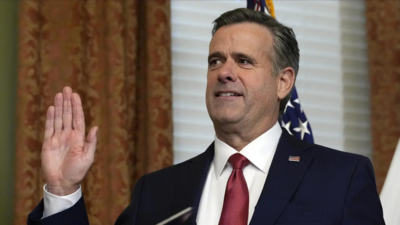
The Senate confirmed John Ratcliffe as CIA director on Thursday, making him President Donald Trump’s second successful cabinet appointment.
Ratcliffe, a former director of national intelligence and a Texas Republican, is the first person to have held both positions.
At his Senate hearing last week, Ratcliffe emphasised the need for the CIA to improve its use of technology, such as artificial intelligence, to confront adversaries like Russia and China while also ensuring the protection of Americans’ civil rights. He pledged to push the agency to harness technologies like AI and quantum computing and expand the use of human intelligence collection.
“We’re not where we’re supposed to be,” Ratcliffe told members of the Senate Intelligence Committee.
Despite concerns raised by some Democrats about Ratcliffe’s ability to lead the CIA objectively, the Senate voted 74-25 to confirm him, with many Democrats voting against the nomination. Republicans praised his experience and expressed eagerness to confirm the rest of Trump’s national security nominees.
Ratcliffe was sworn into office shortly after winning Senate confirmation. The CIA director position has not always been part of the president’s Cabinet, but President Joe Biden elevated it to Cabinet level under Ratcliffe’s predecessor, William Burns, and Trump’s White House lists Ratcliffe as a Cabinet member.
Trump and other Republicans have criticised the work of the CIA and other spy agencies, arguing that they have focused too much on issues like climate change and workforce diversity. The calls for a broad overhaul have worried some current and former intelligence officials, who say the changes could make the country less safe.
Ratcliffe has identified China as America’s greatest geopolitical rival and also noted that Russia, Iran, North Korea, drug cartels, hacking gangs, and terrorist organisations pose challenges to national security. He supports the Foreign Intelligence Surveillance Act, a government spying program that allows authorities to collect the communications of non-Americans outside the country without a warrant, even if they are communicating with Americans.
As a Trump loyalist, Ratcliffe defended the president during his first impeachment proceedings and forcefully questioned former special counsel Robert Mueller when he testified before lawmakers about his investigation into Russian interference in the 2016 election. As director of national intelligence, Ratcliffe oversaw and coordinated the work of more than a dozen spy agencies, including efforts to detect and counter foreign influence on US politics.
Trump initially picked Ratcliffe for the director of national intelligence position in 2019, but he withdrew from consideration after lawmakers raised questions about his qualifications. He was ultimately confirmed by a sharply divided Senate after Trump resubmitted the nomination.
Democrats accused Ratcliffe of politicising intelligence when, as director of national intelligence, he declassified Russian intelligence purporting to reveal information about Democrats during the 2016 election, even as he acknowledged the information might not be accurate. Before Thursday’s confirmation vote, Democrats questioned whether Ratcliffe would prioritise loyalty to Trump over the duties of the office, leading to a two-day postponement of the vote.
Meanwhile, Trump’s second-term nominee for director of national intelligence, Tulsi Gabbard, is expected to face a tougher road to confirmation due to bipartisan criticism over her past comments supportive of Russia and 2017 meetings with then-Syrian President Bashar Assad. Gabbard’s confirmation hearing before the Senate Intelligence Committee is scheduled for January 30.
Ratcliffe’s appointment follows Marco Rubio’s appointment as secretary of state earlier in the week. Rubio was swiftly confirmed with unanimous 99-0 votes, giving President Donald Trump his first Cabinet member on Inauguration Day.

































